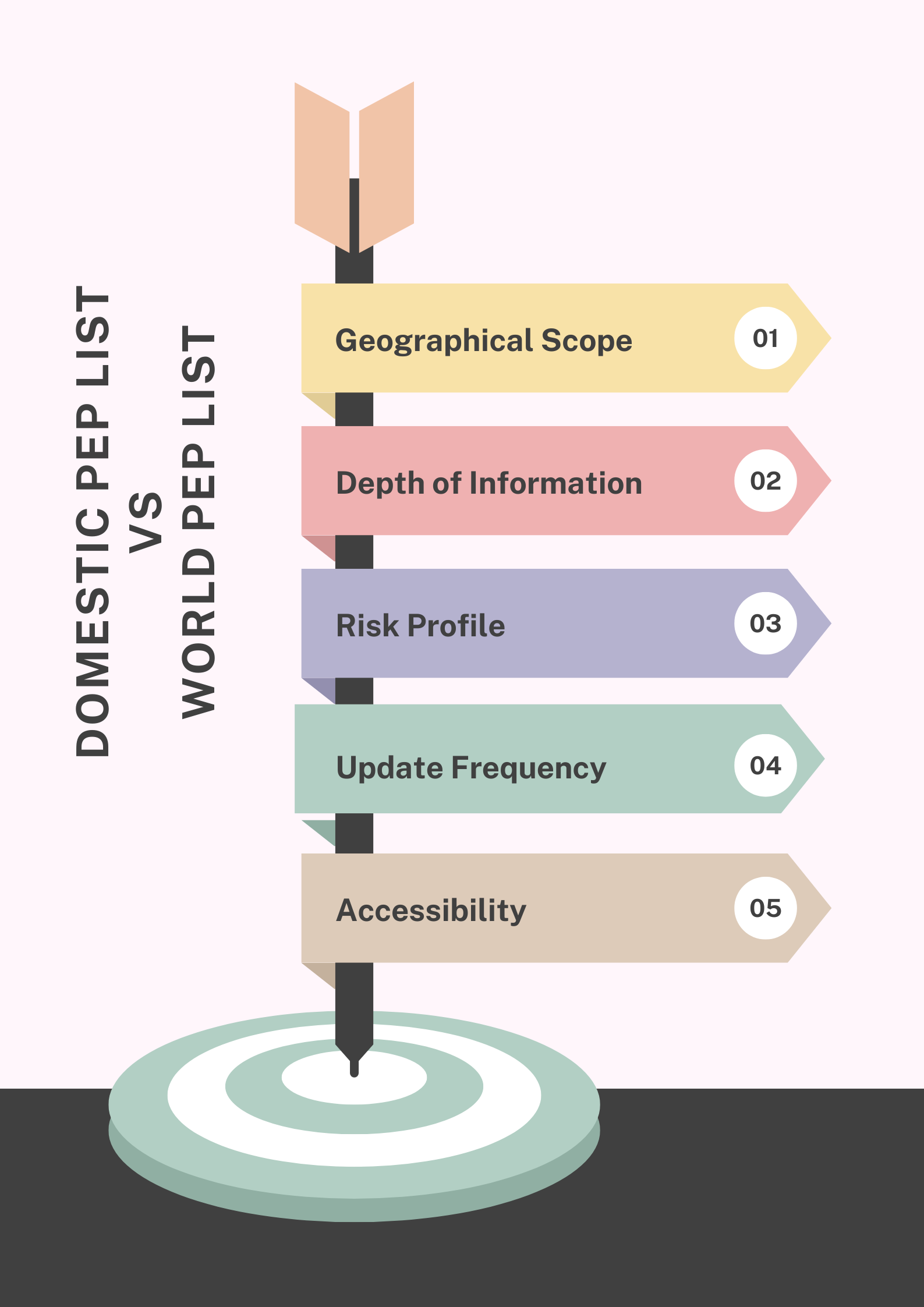The PEP List is the compilation of individuals (politically exposed persons, PEP) who hold prominent public positions usually in governance, making them liable to commit financial fraud like bribery, corruption, money laundering, and sponsoring terrorism. As a result, financial institutions worldwide have implemented stringent measures to identify and manage risks associated with PEPs.
Financial institutions often rely on two primary types of PEP lists to effectively mitigate risks: domestic and world. Each list serves a distinct purpose, and understanding the differences between them is crucial for effective AML compliance.
Nigeria, a country with daily news of corruption and financial crime implicating its government is increasingly exposed to the risks associated with PEPs. To effectively fight financial crime and protect its integrity and that of other countries who may consider doing business with the country in the future, the country needs its own domestic PEP list different from the World PEP List
This blog post will delve into the distinctions between domestic PEP lists and world PEP lists, highlighting the importance of both in comprehensive risk management.
What is a Domestic PEP List?
A domestic PEP list is a compiled database containing the names of persons who have held or are holding a prominent office or position on behalf of a country. In Nigeria, a domestic or local PEP list includes the names of Nigerian citizens who have once occupied or are currently occupying roles in the local, state and federal government.
What is the Purpose of a Domestic PEP List?
The main purpose of a country having a domestic PEP list is to help financial institutions and other regulated entities identify and assess the risks associated with doing business with these PEPs. By maintaining an updated domestic PEP list, these organizations can carry out appropriate due diligence measures and comply with AML /CFT regulations.
Here, we will focus more on Nigerian politically exposed persons.
The Nigerian Politically Exposed Persons (PEPs)
Politically Exposed Persons (PEPs) in Nigeria are individuals holding significant public positions who are susceptible to bribery and corruption due to the public position they occupy. These individuals are often in positions of power and influence, which can be exploited for personal gain.
The PEP List in Nigeria is an example of a Domestic PEP List. The Central Bank of Nigeria on the 22nd of June 2023 issued Guidance Notes on Politically Exposed Persons in Nigeria.
Examples of PEP in Nigeria: Who is a PEP in Nigeria?
According to the Central Bank of Nigeria (CBN) and the Money Laundering (Prevention and Prohibition) Act, 2023, PEPs in Nigeria can be categorized into:
1. Domestic PEPs: Nigerians holding prominent public functions such as:
- President, Vice President, Governors, Deputy Governors
- Ministers, Commissioners, Special Advisers
- Members of the National Assembly, State Houses of Assembly, and Local Government Councils
- Judges, Justices of the Supreme Court, and Appeal Courts
- Military and Police Commanders
- Senior executives of government-owned corporations
- Important political party officials
2. Foreign PEPs: Individuals holding prominent public functions in foreign countries or international organizations and their family members or close associates.
Why is PEP Screening Important in Nigeria?
PEP screening is important for Nigerian financial institutions to:
- Mitigate risks: Reduce the likelihood of being involved in money laundering, corruption, and other financial crimes.
- Comply with regulations: Adhere to anti-money laundering (AML) and counter-terrorism financing (CTF) laws.
- Protect reputation: Avoid negative publicity associated with dealing with high-risk individuals.
What are the Challenges in Identifying PEPs in Nigeria?
- Constant changes in the political landscape: The political environment in Nigeria is dynamic, making it challenging to keep PEP lists updated.
- Definition discrepancies: There might be variations in interpreting who qualifies as a PEP across different institutions.
- Family members and associates: Identifying and verifying the relationships of PEPs can be complex.
Despite these challenges, effective PEP screening is essential for maintaining the integrity of Nigeria's financial system.
What is a World Compliance PEP List?
The World Compliance PEP list is a detailed list of PEPs from different countries, their family members and close associates. The list includes individuals holding positions in international organizations, foreign governments, and other prominent global roles. There is no global meaning of the PEP list, FATF however has given guidelines to what the AML world compliance PEP list looks like or contains.
What is the Purpose of the World Compliance PEP List?
The world compliance PEP list is important for financial institutions that do business outside their country location. By screening against this list, they can identify potential PEPs who may not be captured by the domestic list. PEP screening for banks helps to mitigate risks associated with cross-border transactions and international business relationships.
Domestic PEP vs Foreign PEP: What is the Difference between the Foreign PEP List and the Domestic PEP List?

Foreign PEPs are people who hold important public positions on behalf of a foreign government, and whose positions differ from the government where the financial institution is geographically located. These positions may include president, vice president, minister, senior soldier, state company directors, etc.
According to FATF, Domestic PEPs are high-risk people who hold public positions within their country. While both domestic and world PEP lists serve an important function in risk management, they are different in some ways.
It is important to note that there are different types of politically exposed persons and individuals. Also, an individual being classified as a PEP does not mean they have been involved in criminal activities. Rather, it means that financial institutions need to take precautions with them as they pose a high risk.
Let us discuss how local or domestic PEP lists differ from the world or foreign ones.
1. Geographical Scope:
The domestic PEP List focuses on individuals holding high-level positions within a specific country.
The World PEP List focuses on individuals from across the world.
2. Depth of Information:
The domestic PEP List contains detailed information about PEPs , their positions, family relatives, and business associates.
The World AML PEP List contains less detailed information because of its broader scope.
3. Risk Profile:
PEPs on the domestic list are generally considered as lower risk compared to foreign PEPs, however, some domestic PEPs may still pose higher risks.
PEPs on the global PEP list are seen as riskier and need scrutiny, and enhanced due diligence as financial institutions may have little or no knowledge of the foreign country’s political landscape and corruption risks.
4. Update Frequency:
Domestic PEP lists are updated more frequently to show changes in government and political landscapes.
The Global PEP list may not be updated as frequently as the domestic PEP list because of the large amount of data/information involved.
5. Accessibility:
The domestic PEP list is often restricted to domestic financial institutions and regulatory bodies. However, the Nigerian PEP list can be accessed freely on Youverify’s PEP Sanction and Screening platform.
The world compliance PEP list is usually available through commercial data providers or international organizations.
Understanding these differences between the domestic PEP list and the AMl world compliance list is crucial for financial institutions to implement effective PEP screening processes. By utilizing both domestic and world PEP lists, organizations can enhance their ability to identify and manage risks associated with politically exposed persons.
What is the importance of the Domestic PEP List and the World PEP List?
The domestic and world AML compliance PEP lists are important for assessing and managing risks associated with PEPs regarding AML/CFT compliance.
The following are the reasons domestic and world PEP lists are important:
1. Risk Management:
The domestic and world PEP list helps banks assess the risks associated with engaging in businesses with PEPs who may be more susceptible to bribery or corruption due to their position.
2. Regulatory Compliance:
The PEP list allows businesses to comply with AMl regulations and the Financial Action Task Force (FATF) guidelines, which mandates enhanced due diligence for transactions involving PEPs.
3. Enhanced Due Diligence:
Both lists allow financial institutions to conduct a thorough due diligence investigation. By cross-referencing information from different sources, organizations and businesses can gain a better understanding of the potential risks associated with an individual.
4. Prevention of Financial Crimes
Engaging with PEPs without proper screening can expose institutions to significant risks, including money laundering and reputational damage. The Domestic and World PEP List aids in identifying these risks before they materialize.
5. Understanding International Dynamics:
The World PEP List helps institutions navigate the complexities of international business, as foreign PEPs may present unique challenges, such as differing legal frameworks and potential corruption risks that are less familiar to local institutions.
PEP List in Nigeria: Does Nigeria have a PEP List?
In an era marked by increasing financial crime, the importance of robust PEP screening cannot be overstated. Understanding the differences between domestic and world PEP lists will help financial institutions to significantly enhance their risk management capabilities.
Youverify has taken a significant step forward in the fight against financial crime with the creation of its first-ever Domestic PEP List in Nigeria. This groundbreaking initiative is a testament to Youverify’s commitment to AML/CFT best practices and regulatory compliance.
By prioritizing PEP screening and leveraging the power of both domestic PEP lists in Nigeria and world PEP lists, organizations can protect their reputation, mitigate financial risks, and contribute to a safer financial ecosystem.
To revolutionize your PEP screening process and gain a competitive edge, contact us today for a FREE demo and to learn more about our pioneering Domestic PEP List in Nigeria.
